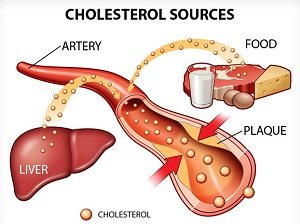Is it Really that Bad?
It is found in the cell membrane where it aids in maintaining the correct fluidity of the membrane. Healthy individuals synthesize all the Cholesterol needed by their bodies.
Plant Foods including vegetable oils contain very little Cholesterol.
However, these are often advertised as "no cholesterol" or "zero cholesterol" that misleads consumers.
It is important to note that the manufacturer has not done much but this is the gift of nature.
However, animal foods like egg yolk, milk and liver contain good amount of cholesterol because it synthesizes and stores it.
However, it adjusts the amount synthesized according to the amount of cholesterol ingested through food.
Cholesterol is required by the body for a variety of functions, as it serves the body functions in the following ways :-
- Structural Component of cell membrane
- Component of Bile acids
- Component of Brain lipids
- Synthesis of Hormones
Total Cholesterol in blood should not exceed >200 mg/100 ml plasma.
Maximum 200 mg cholesterol per day from dietary sources is recommended for an healthy individual.
Cholesterol Content of Foods (mg/100 g) :-
- Butter - 250
- Ghee - 300
- Cow's Milk - 14
- Buffalo's Milk - 16
- Skimmed Milk - 2
- Condensed Milk - 40
- Cream - 40
- Cheese - 100
- Egg Whole - 400
- Egg Yolk - 1020
- Chicken without skin - 60
- Chicken with skin - 100
- Mutton - 13
- Beef - 70
- Prawns & Shrimp - 150
- Pork - 90
- Lean Fish - 45
- Fatty Fish - 45
- Brain - 2000
- Liver - 300
- Kidney - 370
-The advantages of a vegetarian diet are that it is low in calories, fat and cholesterol and that it has adequate fibre which helps in binding cholesterol and increase the excretion of cholesterol.
-Vegetable Oils diminish the plasma cholesterol not only due to polyunsaturated fatty acids but also because the plant sterol inhibits cholesterol absorption.
-Plant sterols have been found to reduce serum cholesterol by 10% - 14% in normal, hyperlipidemic and diabetic subjects. Other sources of phytosterols are wheat, oats, wheat germ, wheat bran, sesame, walnuts, almonds etc.

No comments:
Post a Comment